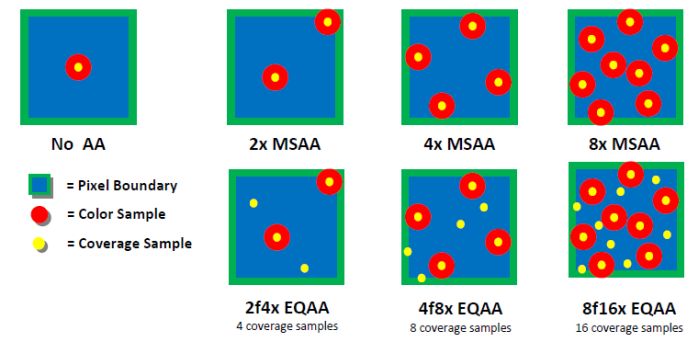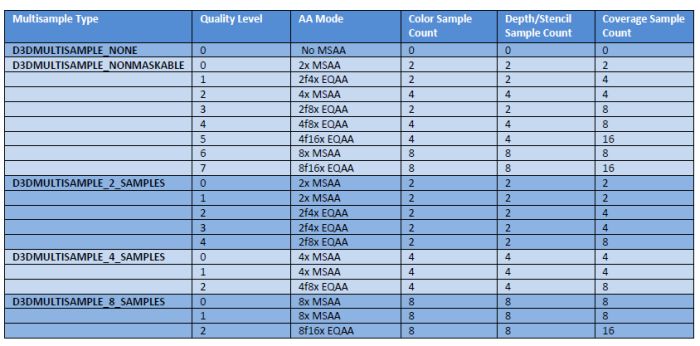
AMD EQAA or Enhanced Quality Anti-Aliasing is a new anti-aliasing technique available for Radeon HD 6900 series. EQAA brings advanced smoothing of aliased edges without requiring additional video memory, and with a minimal performance cost.
EQAA is available only with Direct3D 9/10/11 (no OpenGL support). Like NVIDIA CSAA (see HERE), you can enable EQAA by setting the correct multisample quality level:

Quality levels for D3D9

Quality levels for D3D10 / D3D11
For more information about AMD EQAA, here is the complete doc:
EQAA Modes for AMD 6900 Series Graphics Cards (PDF).
Is the 8f16x EQAA the same thing as the 16xQ from nVidia? Are AMD’s coverage samples the same deal as those of nVidia?
no it’s not. 16xQ=quality/sharpness the edges 16xS=softens the edges
16xS eats up more performance then 16xQ
done it over half life 2 EP. 2
iv done 32x on a openGL viewer (perfect look) but after nvidia updates the drivers i couldn’t use it anymore :<
grab nvidia inspector and mess with the huge list of AA's
IIRC 8xQ is MSAA or CSAA with 0 coverage samples. 16x is 4x*4 and 16xQ is 8x*2. 8x is 4x*2
For AMD 4x is MSAA4x, 8x is MSAA8x (and is the same thing as 8xQ in GF), 4f8x is similar to nvidia 8x and 8f16x is similar to 16xQ in GF.
http://developer.nvidia.com/csaa-coverage-sampling-antialiasing
AMD has failed with MLAA so they creating new anti-aliasing. 😀 AMD – born to fail.
@Anon – EQAA is just slightly younger than MLAA (Cayman launch vs Barts launch) and since MLAA is something totally different than MSAA and EQAA you just can’t compare it with those mentioned 😉 You can compare it with GPAA, GBAA, FXAA however. And FYI you can enable EQAA + MLAA at the same time. I guess the only fail is yours – to understand technologies behind it.
Bring on retina displays for PCs, then we can turn off pixel modifying/blending.